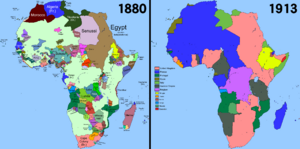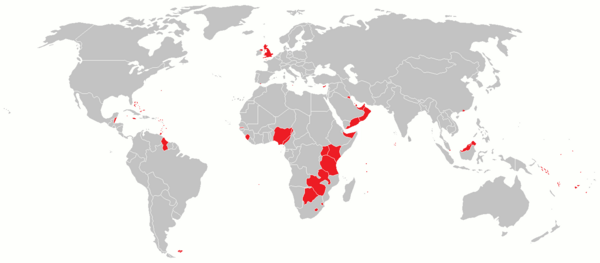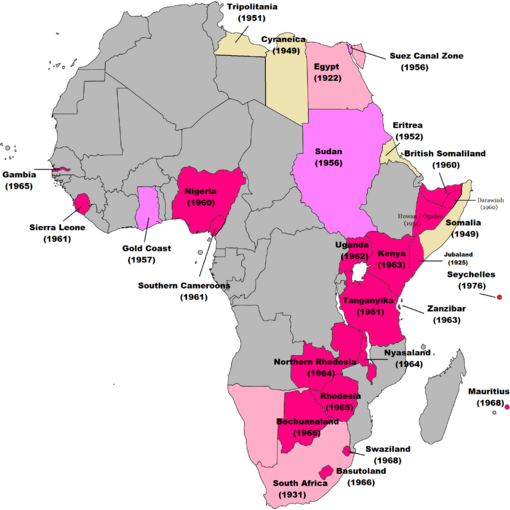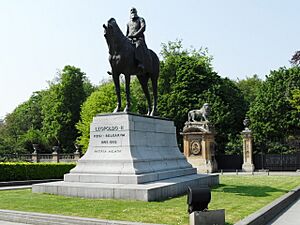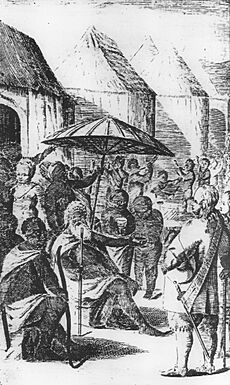Decolonisation of Africa facts for kids
The decolonisation of Africa was a big change in Africa from the mid-1950s to 1975. During this time, colonial governments, which were controlled by European countries, were replaced by independent countries. This process was often difficult, with violence, political problems, and revolts.
Some important events during Africa's decolonisation included the Mau Mau rebellion in Kenya, the Algerian War, the Congo Crisis, and the Angolan War of Independence.
Contents
Background
The "Scramble for Africa" happened between 1870 and 1914. During this time, European countries quickly took over almost all of Africa. They wanted Africa's natural resources and land. This division of Africa was agreed upon at the Berlin Conference in 1885. European powers did not care about the existing African kingdoms or societies.
Almost all African states lost their independence. Only Liberia and Ethiopia remained free. Liberia was settled by former enslaved African-Americans. Ethiopia fought and won its independence at the Battle of Adwa, though it was later taken over by Italy for a short time. By 1977, 50 African countries had become independent from European rule.
Why Decolonisation Happened: Outside Reasons
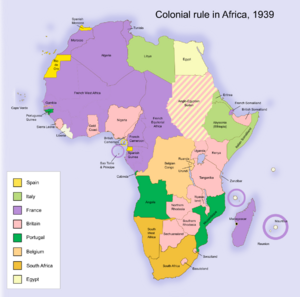
In the early 1900s, people around the world started to feel a stronger sense of nationalism. This is a feeling of pride in one's own country and a desire for it to be independent. After World War I, big empires like the German and Ottoman Empires broke apart. People started talking about "self-determination," which means the right of people to choose their own government.
Many Africans fought in both World War I and World War II. They helped European armies, often in difficult conditions. This made them expect more respect and a say in their own future. However, European powers did not want to give up their colonies. They needed Africa's resources and people to rebuild Europe after the wars.
In 1941, US President Franklin D. Roosevelt and British Prime Minister Winston Churchill created the Atlantic Charter. This document said that all people had the right to choose their own government. While Churchill first said this only applied to Europe, many anti-colonial leaders saw it as a promise for all colonies.
After World War II, the United Nations was formed. In 1948, the UN's Universal Declaration of Human Rights stated that all people are born free and equal. This put more pressure on colonial powers to grant independence. Italy lost its African colonies after World War II. Other colonies, like Nigeria and Ghana, pushed for self-rule because the colonial powers were tired and weak from the war.
In 1960, the United Nations passed a declaration saying that colonial rule was wrong and that power should be given back to the countries concerned.
Why Decolonisation Happened: Inside Reasons
Colonial powers often took Africa's resources, like minerals, and sent the profits to Europe. This meant that African countries could not develop their own economies. This caused a lot of anger and a desire for change among Africans.
By the 1930s, some African leaders had been educated in Western universities. There, they learned about ideas like self-determination. These leaders, such as Jomo Kenyatta (Kenya), Kwame Nkrumah (Ghana), and Julius Nyerere (Tanzania), became important figures in the fight for African nationalism.
During World War II, some local African industries and towns grew. This happened because it was harder to ship raw materials to Europe. This growth led to more education and the creation of pro-independence newspapers. By 1945, the Fifth Pan-African Congress, a meeting of African leaders, demanded an end to colonialism.
Economic and Social Changes
Economy
Colonial powers built infrastructure like roads and railways in Africa. However, these were mostly built to help take resources out of Africa, not to help local development. African economies were set up to benefit the colonizers. After independence, many African countries still relied on selling raw materials like copper or tea.
Language
Colonial rule often led to the use of European languages, like English or French, in African countries. This sometimes caused local African languages to be used less. It also sometimes created new divisions and conflicts between different groups in Africa.
Law
Right after independence, many African countries kept the laws from their colonial rulers. But over time, most of these colonial laws were replaced by new laws written by the African countries themselves.
Becoming Independent
After World War II, many African countries quickly gained their independence from European rule. The Atlantic Charter helped push this forward.
European countries were deep in debt after the war. They could no longer afford to control their African colonies. This allowed African leaders to negotiate for independence. Some countries gained independence peacefully, but others had to fight, leading to many deaths.
The United States supported African independence. However, they also wanted to make sure that the new African leaders were not communist. American groups also pressured their government to stop supporting countries in Africa that were not ruled by the majority of the people.
| Country | Colonial name | Colonial power | Independence date |
|---|---|---|---|
| N/A | N/A | N/A | |
| 26 July 1847 | |||
| 31 May 1910 | |||
| 28 February 1922 | |||
| 1 March 1949 | |||
| 24 December 1951 | |||
| 24 December 1951 | |||
| 1 January 1956 | |||
| 20 March 1956 | |||
| 2 March 1956 7 April 1956 10 April 1958 4 January 1969 14 November 1975 27 February 1976 |
|||
| 6 March 1957 | |||
| 2 October 1958 | |||
| 4 March 1916 1 January 1960 1 October 1961 |
|||
|
27 April 1960 | ||
| 20 June 1960 | |||
| 26 June 1960 | |||
| 30 June 1960 | |||
| 26 June 1960 1 July 1960 |
|||
| 1 August 1960 31 July 1961 |
|||
| 1 August 1960 | |||
| 3 August 1960 | |||
| 5 August 1960 | |||
| 7 August 1960 | |||
| 11–12 August 1960 | |||
| 13 August 1960 | |||
| 14–15 August 1960 | |||
| 16–17 August 1960 | |||
| 1 October 1960 1 June 1961 1 October 1961 |
|||
| 28 November 1958 28 November 1960 |
|||
| 27 April 1961 | |||
| 9 December 1961 | |||
| 1 July 1919 1 July 1962 |
|||
| 5 July 1962 | |||
| 9 October 1962 | |||
| 12 December 1963 | |||
| 10 December 1963 | |||
| 6 July 1964 | |||
| 24 October 1964 | |||
| 18 February 1965 | |||
| 11 November 1965 | |||
| 30 September 1960 – 1966 | |||
| 4 October 1966 | |||
| 12 March 1968 | |||
| Swaziland | 6 September 1968 | ||
| 4 March 1916 1 January 1960 16–17 August 1960 1 October 1961 12 October 1968 |
|||
| 24 September 1973 10 September 1974 (recognised) 5 July 1975 |
|||
| 25 June 1975 | |||
| 5 July 1975 | |||
| 6 July 1975 | |||
| 12 July 1975 | |||
| 11 November 1975 | |||
| 29 June 1976 | |||
| 27 June 1977 | |||
| 27 February 1976 independence not yet effected |
|||
| October 27, 1966 (de jure) 21 March 1990 |
|||
| September 15th 1952 (Federated with Ethiopia) May 24th 1993 independence) |
British Empire
The British Empire was one of the largest colonial powers in Africa.
Ghana's Independence
On March 6, 1957, Ghana (which used to be called the Gold Coast) became the first country in sub-Saharan Africa to gain independence from European rule. Its leader, Kwame Nkrumah, made it clear that he wanted self-government. He believed all colonial peoples should control their own future.
In 1948, some Ghanaian soldiers who had fought in the war were killed by colonial police during a protest. This led to riots and made the independence movement stronger. Nkrumah started the Convention People's Party (CPP), which campaigned for "Self Government Now!" The party became very popular. In 1951, the CPP won many seats in the government. The British government then changed the Gold Coast Constitution to give Ghanaians more power. In 1957, Ghana became independent with Nkrumah as its prime minister.
The "Wind of Change"
In 1960, British Prime Minister Harold Macmillan gave a famous speech in South Africa. He spoke of a "wind of change blowing through this continent." He wanted to avoid violent wars like the one France was fighting in Algeria. Because of this, Britain quickly granted independence to most of its remaining African colonies by 1968.
However, British withdrawal from some parts of southern and eastern Africa was not peaceful. In Kenya, the Mau Mau Uprising was a long and violent conflict before independence. In Rhodesia, the white minority declared independence in 1965, which led to a civil war. This war lasted until 1979, and the country finally became independent as Zimbabwe in 1980.
Belgium
Belgium controlled a few territories in Africa. The most important was the Belgian Congo (now the DRC), which was about 76 times larger than Belgium itself. From 1885 to 1908, the Congo was the personal property of Belgium's King Leopold II. His rule was very harsh and violent, leading to international pressure on Belgium to take official control.
Belgian rule in the Congo involved the government, missionaries, and private companies working together. In the 1940s and 1950s, the Congo grew, and the Belgians tried to make it a "model colony." However, a strong movement for independence grew, and the Congo became independent in 1960.
Belgium also controlled Ruanda-Urundi (now Rwanda and Burundi). This area was given to Belgium after World War I when Germany lost its colonies. After the Rwandan Revolution, Ruanda-Urundi became the independent states of Burundi and Rwanda in 1962.
French Colonial Empire
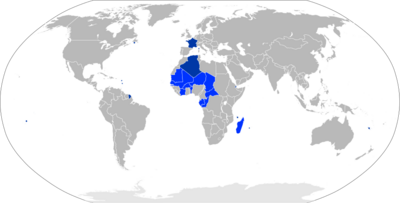
The French colonial empire began to weaken during World War II. Many French colonies were taken over by other countries. After the war, French leader Charles de Gaulle wanted to keep the empire together in a new way. The French Union was created, but Paris still had full control. Colonies had local assemblies, but with limited power.
De Gaulle held a big meeting in Brazzaville, central Africa, in 1944. He made some promises, like ending forced labor and allowing Africans to be represented in the French Assembly. However, he clearly said that full independence was not an option.
Conflicts for Independence
After World War II, France faced many independence movements. In Algeria, protests in 1945 were met with violence, and many Algerians were killed. There was also unrest in Madagascar in 1947, which was put down harshly.
Algerian War
France had controlled Algeria for over a century. The Algerian War for independence started in 1954. This was a very brutal war with terrible acts on both sides. Many people were killed. Algeria was a complicated conflict because many Europeans had settled there over 125 years of French rule.
The war caused a political crisis in France. Charles de Gaulle returned to power in 1958 and finally pulled French soldiers and settlers out of Algeria by 1962. The war lasted more than eight years, and it's estimated that between 300,000 and 400,000 people died. In 1962, the National Liberation Front signed a peace agreement with France. Most of the one million Europeans in Algeria left the country.
French Community Dissolves
The French Union was replaced by the French Community in 1958. Only Guinea refused to join this new organization. However, the French Community soon fell apart because of the Algerian War. Almost all other French African colonies gained independence in 1960 after local votes.
Some critics said that a new form of control, called Françafrique, replaced direct rule. They argued that while France granted independence, it also created new ties to keep influence over its former colonies.
The last French colony to gain independence in Africa was French Somaliland (now Djibouti) in 1977.
Sweden
Sweden briefly controlled some settlements on the Gold Coast (modern Ghana) from 1650 to 1663.
Cape Coast
In 1652, the Swedes took over Cape Coast in modern Ghana. They built the Carolusburg Castle there, which is now known as the Cape Coast Castle.
United States
Colony of Liberia
The Colony of Liberia was a private colony started by the American Colonization Society (ACS) in 1822. It became an independent country, the Republic of Liberia, after declaring independence in 1847.
Images for kids


